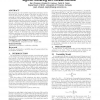Free Online Productivity Tools
i2Speak
i2Symbol
i2OCR
iTex2Img
iWeb2Print
iWeb2Shot
i2Type
iPdf2Split
iPdf2Merge
i2Bopomofo
i2Arabic
i2Style
i2Image
i2PDF
iLatex2Rtf
Sci2ools
116
click to vote
DAC
2009
ACM
2009
ACM
Clock skew optimization via wiresizing for timing sign-off covering all process corners
Manufacturing process variability impacts the performance of synchronous logic circuits by means of its effect on both clock network and functional block delays. Typically, variability in clock networks is either handled early in the design flow by assigning margins to clock network delays, or at a later stage through post-processing steps that only focus on achieving minimal skew, without regard to functional block variability. In this work, we present a technique that alters clock network lines so that the circuit meets its timing constraints at all process corners. This is done near the end of the design flow while considering delay variability in both the clock network and the functional blocks. Our method operates at the physical level and provides designers with the required changes in clock network line widths and/or lengths. This can be formulated as a Linear Programming (LP) problem, and thus can be solved efficiently. Empirical results for a set of ISCAS-89 benchmark circ...
| Added | 19 May 2010 |
| Updated | 19 May 2010 |
| Type | Conference |
| Year | 2009 |
| Where | DAC |
| Authors | Sari Onaissi, Khaled R. Heloue, Farid N. Najm |
Comments (0)

